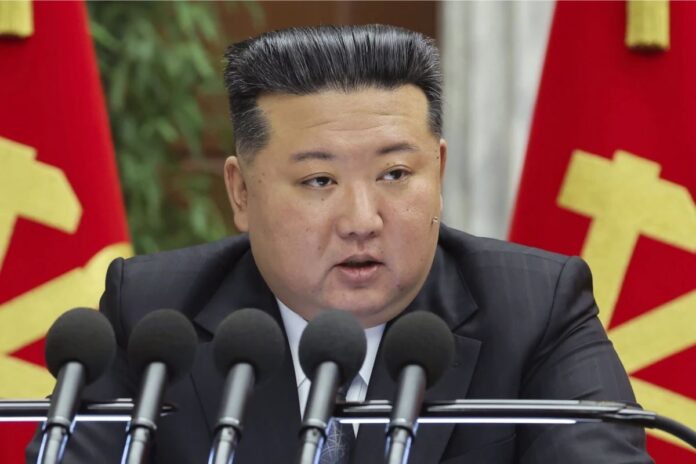Anti-U.S. policy remains a central focus for North Korea as the country’s leader Kim Jong Un promises the “toughest” stance against the United States ahead of Donald Trump’s presidential inauguration. North Korea’s rhetoric towards the U.S. escalates with these recent statements, made just a month before Trump is set to take office. The heightened tensions come amid uncertain prospects for direct talks between the U.S. and North Korea, following the collapse of previous summit talks and the ongoing international political climate.
Kim Jong Un’s Anti-U.S. Commitment
Anti-U.S. policy has been a longstanding feature of North Korean foreign policy, but Kim’s remarks at a recent plenary meeting of the Workers’ Party signal a new era of military posturing. According to the official Korean Central News Agency, Kim declared the U.S. to be “the most reactionary state” and accused the country of promoting anti-communism. He framed the expanding U.S.-South Korea-Japan security alliance as a “nuclear military bloc” that threatens regional stability.
Kim’s strong statements reflect his commitment to pursuing a more aggressive defense strategy, especially against perceived U.S. threats. “This reality clearly shows to which direction we should advance and what we should do and how,” Kim was quoted saying. His speech underscored a strategy of “toughest anti-U.S. counteraction,” signaling North Korea’s intention to defend its long-term interests and security through military strength.
Strengthening North Korea’s Military Capabilities
The focus on military capabilities is expected to intensify as Kim’s leadership seeks to develop advanced defense technologies. Although KCNA did not provide specific details about the anti-U.S. strategy, it was emphasized that bolstering North Korea’s military infrastructure would be crucial in the coming years. Enhancing the mental toughness of North Korean soldiers also featured prominently in Kim’s speech, aligning with his broader vision of national defense preparedness.
While the public statements are filled with animosity toward the U.S., they also underline Kim’s long-term goal of ensuring the safety and self-sufficiency of North Korea through a formidable military apparatus. Such rhetoric is a continuation of Kim’s efforts to assert North Korea as a significant regional player, capable of standing against foreign powers that it deems adversarial.
The Rise and Fall of U.S.-North Korea Talks
The diplomatic thaw between the U.S. and North Korea under Donald Trump has come to a halt in recent years, largely due to disputes over U.S.-led sanctions. During his first term, Trump famously met with Kim on three occasions in an effort to curb North Korea’s nuclear ambitions. Their meetings, including the 2018 summit in Singapore, marked a shift in diplomacy, with Trump even claiming that he and Kim had “fallen in love.”
However, these talks collapsed by 2019, when the two sides failed to reach an agreement regarding the sanctions relief that North Korea desired. Since then, North Korea has significantly increased its weapons testing programs, with a focus on developing nuclear missile technology aimed at the U.S. and its allies. The growing tension has resulted in a cycle of military drills between the U.S. and South Korea, further straining relations with North Korea.
North Korea’s Military Cooperation with Russia and its Impact
The evolving geopolitical situation, including North Korea’s growing military ties with Russia, complicates any potential diplomatic breakthroughs. U.S. and Ukrainian intelligence assessments suggest that North Korea has provided more than 10,000 troops and conventional weapons to assist Russia in its ongoing war against Ukraine. This alignment has raised concerns about the possibility of North Korea receiving advanced military technologies from Russia in exchange, including nuclear missile expertise.
As North Korea deepens its cooperation with Russia, its relations with the U.S. and its allies become more complicated. Ukrainian President Volodymyr Zelenskyy confirmed last week that approximately 3,000 North Korean troops had been killed or wounded in the conflict in Russia’s Kursk region. These developments provide a glimpse into the increasingly complex international alliances that North Korea is forging, potentially further isolating the country from Western powers.
Ongoing Tensions and Sanction Efforts
The possibility of renewed U.N. sanctions against North Korea remains a contentious issue. Russia and China, both of whom are engaged in separate disputes with the U.S., have consistently blocked U.S.-led attempts to impose additional sanctions on North Korea. Despite the country’s ongoing missile tests, which violate U.N. Security Council resolutions, these two nations continue to shield North Korea from increased international pressure.
Kim Jong Un has made it clear that his stance toward the U.S. will not soften, and his nuclear buildup is a response to what he perceives as Washington’s hostility. As Kim solidifies his anti-U.S. policies, the international community continues to grapple with the implications of North Korea’s weapons development and the growing influence of its military partnerships with Russia and other nations.

